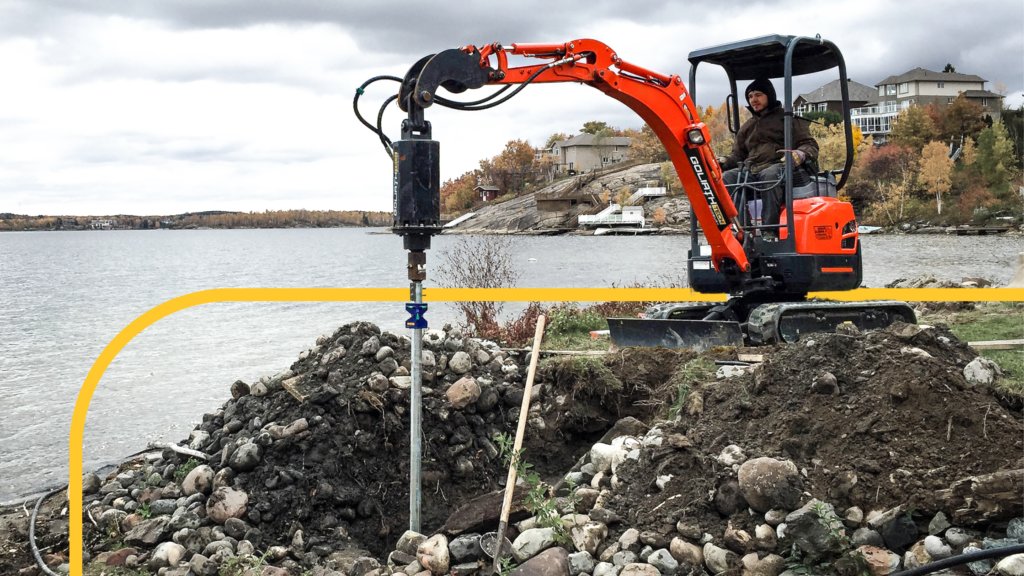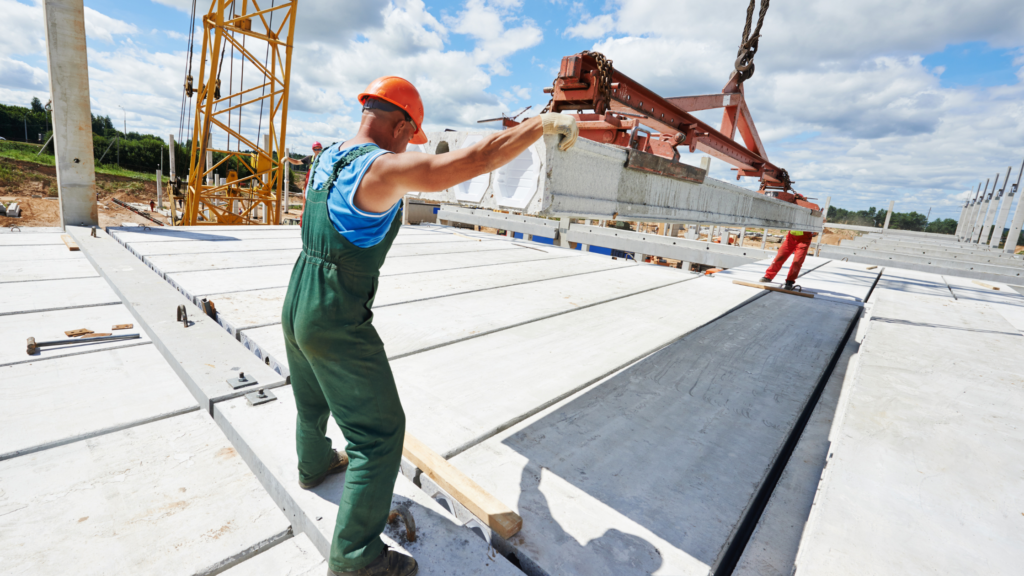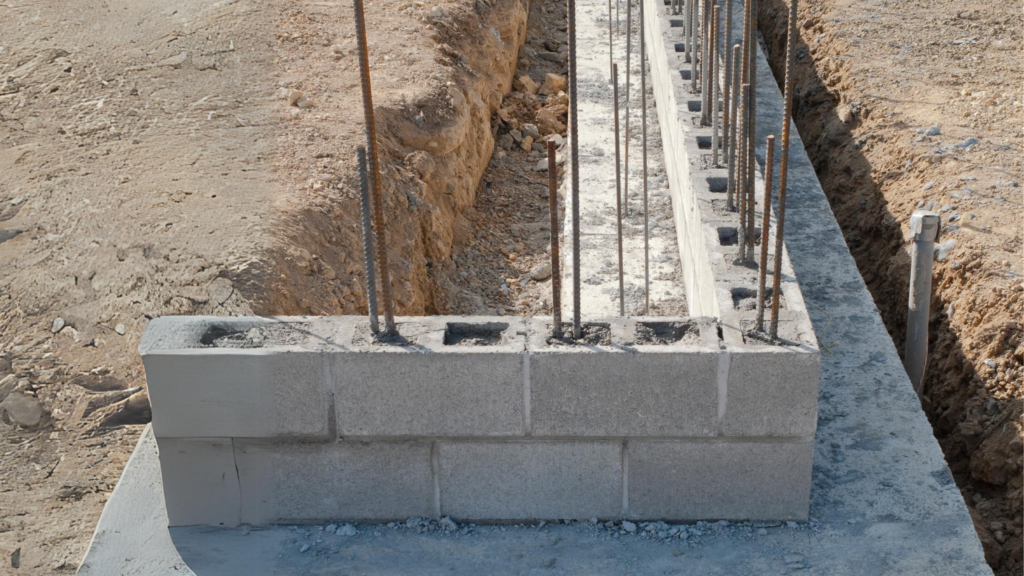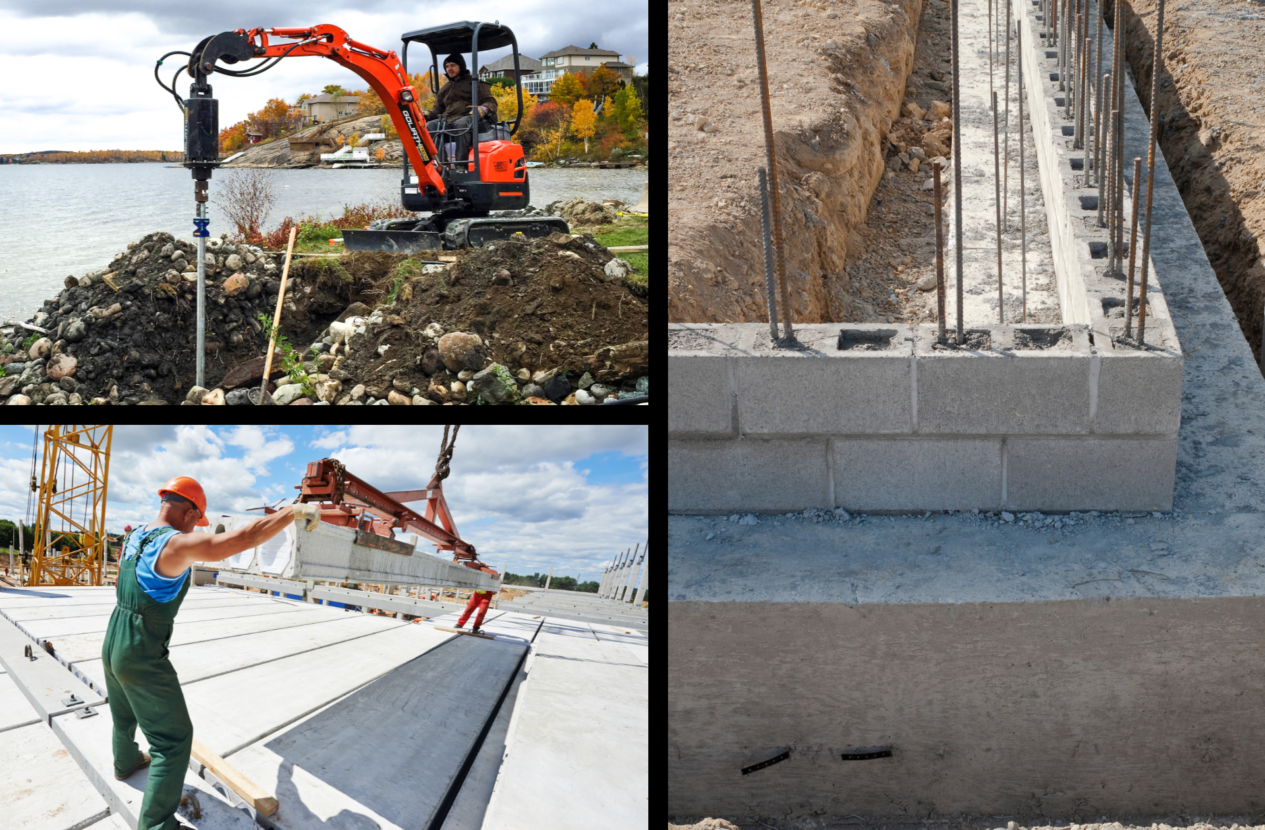Foundations are the essential base of a house, ensuring its stability, durability, and resistance to the elements. They distribute structural loads and prevent soil movements, protecting against the risks of differential settlement. This article will examine how to tell what type of foundation a house has and the three main types of house foundations: concrete slab, screw piles, and strip footings.
- How to Determine the Type of Foundation a House Has?
- Screw Piles
- Concrete Slab
- Strip Footings
- Comparison and Selection of House or Garage Foundation Types
How to Determine the Type of Foundation a House Has?
Determining the types of housing foundations can be essential for various reasons, such as planning renovations, understanding structural integrity, or addressing potential issues. Here are steps to identify the type of foundation:
Examine Exterior: Check for visible signs like concrete slabs or raised columns.
Inspect Basement or Crawlspace: Look for concrete or beams.
Review Documents: Check original construction plans.
Consult Building Codes: Contact local building department.
Ask Previous Owners: Inquire for insights.
Hire a Professional: Consider a home inspector or engineer.

Screw Piles as a Foundation Type for Your House
Screw piles are becoming increasingly popular as a foundation option in residential construction. This method involves screwing steel piles into the ground until reaching a sufficient depth to support the structure's load.
Advantages of Screw Piles in House Foundation:
Adaptability to Unstable Soils: Screw piles can be used on a variety of soils, including unstable and low-bearing soils, providing a stable and effective solution in challenging conditions.
Reduction of Differential Settlement Risk: By distributing the load evenly over a larger surface area, screw piles help minimize the risk of differential settlement, which can lead to structural damage.
Durability in Wet Soils: Unlike other types of foundations, screw piles are less susceptible to the adverse effects of soil moisture, making them a durable option for wet environments.
Compatibility with Concrete Foundations: Screw piles can also be seamlessly integrated with concrete foundations. This is particularly beneficial when building in areas with unstable soils, where the risk of foundation sinking is high. The piles are driven into stable soil, providing a reliable base for pouring concrete over them, ensuring a sturdy and secure foundation for the structure, especially for basements.
Limits of Screw Piles in House Foundation:
Requires Specialized Construction Techniques: Installing screw piles requires specialized skills and equipment. However, with certified GoliathTech installers, this technical requirement is managed, ensuring a professional and reliable installation.

Concrete Slab as a Foundation Type for Your House or Garage
A concrete slab foundation is one of the most commonly used types of foundations in residential construction. It entails pouring a layer of concrete directly onto the ground, creating a sturdy base for the house structure. While it's often combined with other foundation types for houses, it's frequently used alone for garages.
Advantages of Concrete in House and Garage Foundation:
Relatively Low Cost: A concrete slab foundation is often more economical than other types of foundations due to its simple construction.
Adaptability to Different Soil Types: It can be used on a variety of soils, including clayey and sandy soils, making it a versatile option for many construction projects, including garages.
Disadvantages of Concrete in House or Garage Foundation:
Risk of Cracks and Soil Movements: Due to its flat and continuous nature, a concrete slab foundation is prone to cracks and soil movements, especially in areas where the soil is subject to expansion and contraction.
Difficulty in Repair Once Poured: Cracks in a concrete slab can be difficult to repair and may require costly and complex repair work.
Durability: Compared to other types of foundations, a concrete slab foundation may be less durable in certain conditions, requiring more frequent maintenance work.

Strip Footings as a Foundation Type for Your House
Strip footings, also known as continuous footings, are a widely used type of foundation in building construction, including houses and garages. They consist of elongated reinforced concrete elements, typically placed beneath load-bearing walls or posts of the structure.
Unlike concrete slab foundations, which consist of a single concrete slab poured over the entire ground surface, strip footings are linear structures that extend along the load-bearing walls of the house or garage. They are cast directly into trenches excavated to a sufficient depth to reach stable and solid ground.
Advantages of Strip Footings in House Foundation:
Effective Load Distribution: Strip footings are designed to efficiently distribute the weight of the house over a larger surface area of the ground, reducing the pressure exerted on the soil and preventing settlement issues.
Less Susceptible to Soil Movements Than Slab Foundations: Due to their deeper design and closer connection to the ground, strip footings are less prone to soil movements, providing increased stability to the house structure.
Disadvantages of Strip Footings in House Foundation:
Higher Cost Than Slab Foundations: While strip footings offer advantages in terms of stability and load distribution, they may be more expensive to install than concrete slab foundations.
Requires Deeper Excavation Than Other Foundation Types: Constructing strip footings requires deeper excavation, leading to additional costs and more complex work during site preparation.
Comparison and Selection of House or Garage Foundation Types
Factors to Consider When Choosing a Foundation Type:
When it comes to selecting the foundation type for your construction project, several factors must be considered. In this section, we will examine the various considerations to keep in mind to help you make an informed decision. Screw piles stand out as a particularly advantageous option in many cases.
Cost: The initial and long-term costs of different type of house foundation must be evaluated. Although screw piles may initially seem more expensive, they often offer long-term benefits in terms of durability and reduced maintenance costs.
Soil Type: The nature of the soil on which your house will be built plays a crucial role in choosing the foundation type. The foundation type on clayey soil will not be the same as on sandy soil. Screw piles are particularly suited to unstable or difficult soils, offering a reliable solution in various conditions.
Structural Stability: Ensure that the chosen foundation type can guarantee the structural stability of your house, taking into account construction loads and potential risks such as soil movements.
Recommendations for Selecting the Most Suitable Foundation Type for Your Construction Project
In regions where soil conditions are less favorable and prone to foundation settling, screw piles are often used in conjunction with concrete as reinforcement. If someone is building a house with a basement, they can reinforce their foundation by using screw piles. In most cases, GoliathTech screw piles emerge as the optimal foundation choice due to their ability to adapt to unstable soils, lower risk of uneven settlement, and resilience in damp soil conditions. Consulting construction professionals and engineers can lead to selecting screw piles as a strong and enduring solution to guarantee the stability and longevity of your home.
About GoliathTech
Since 2004, GoliathTech has been the most important manufacturer and installer in the helical (screw) pile industry worldwide. Our patented helical pile foundation system surpasses industry standards and has earned us multiple awards and prizes.
Carried out by certified installers, our quick installation process avoids excavation, which protects your landscape and allows you to begin building as soon as the piles are in the ground. Moreover, you can anchor GoliathTech’s helical pile foundations into any soil or space year-round. Installed deep into the ground, beneath the frost line, they solidly support the structure in even the most extreme conditions. Our technology guarantees that a helical (screw) pile foundation won't move or crack over time.
Integrating both strength and know-how, GoliathTech offers the best anchoring solution to support your residential, industrial, commercial, and municipal projects. Trust the experience and expertise of GoliathTech for your foundation projects. Find a certified GoliathTech installer in your region or become a franchisee.
Share this Article


